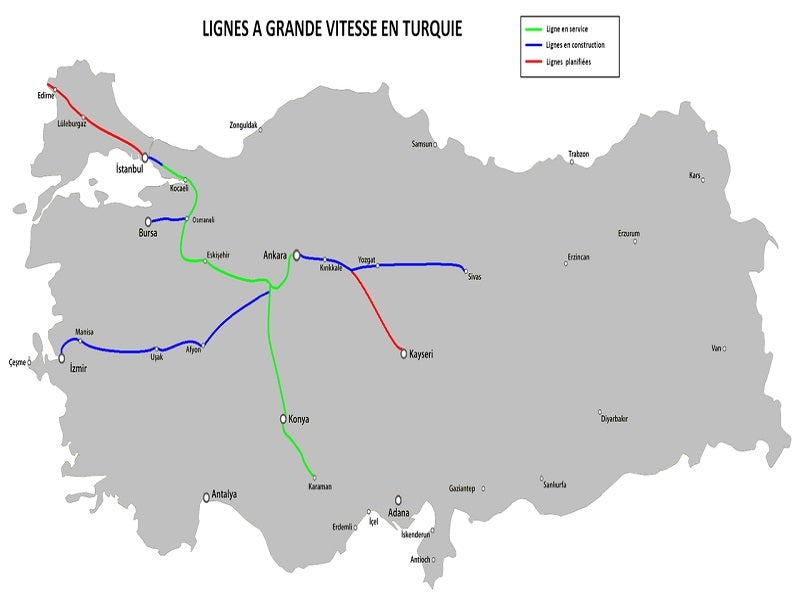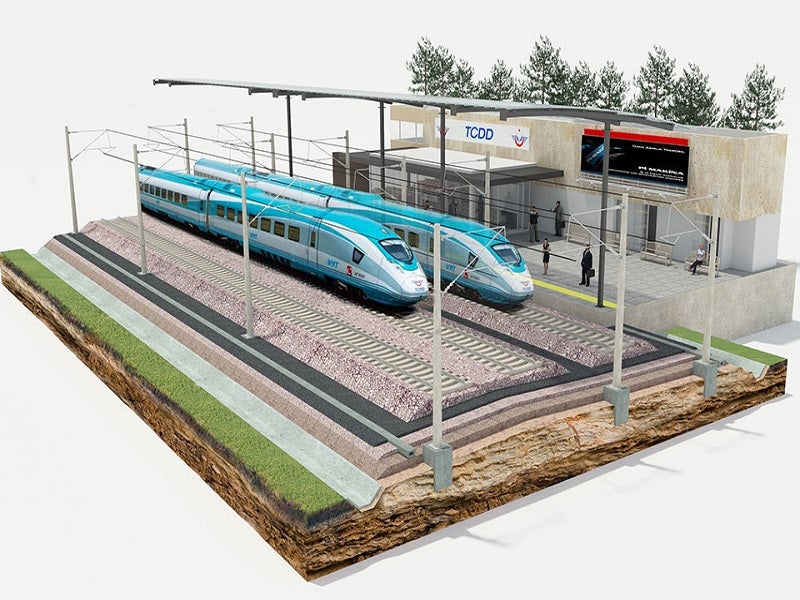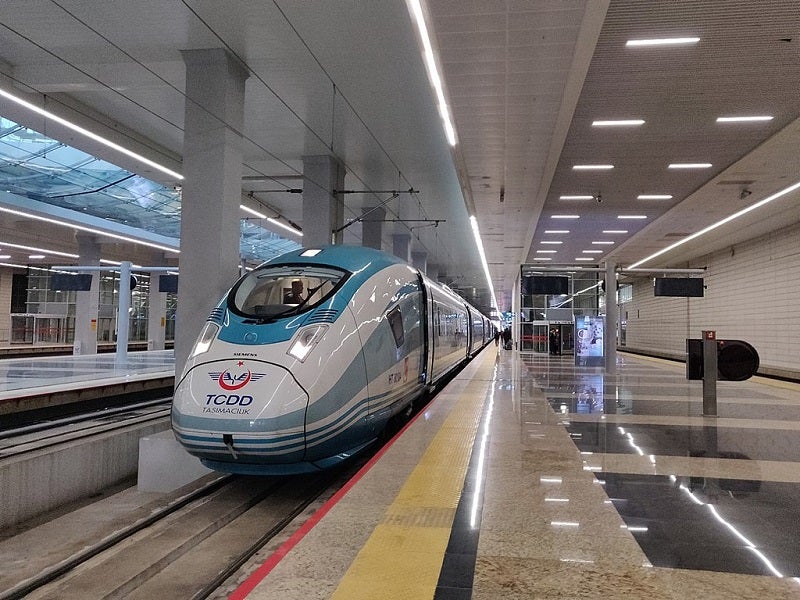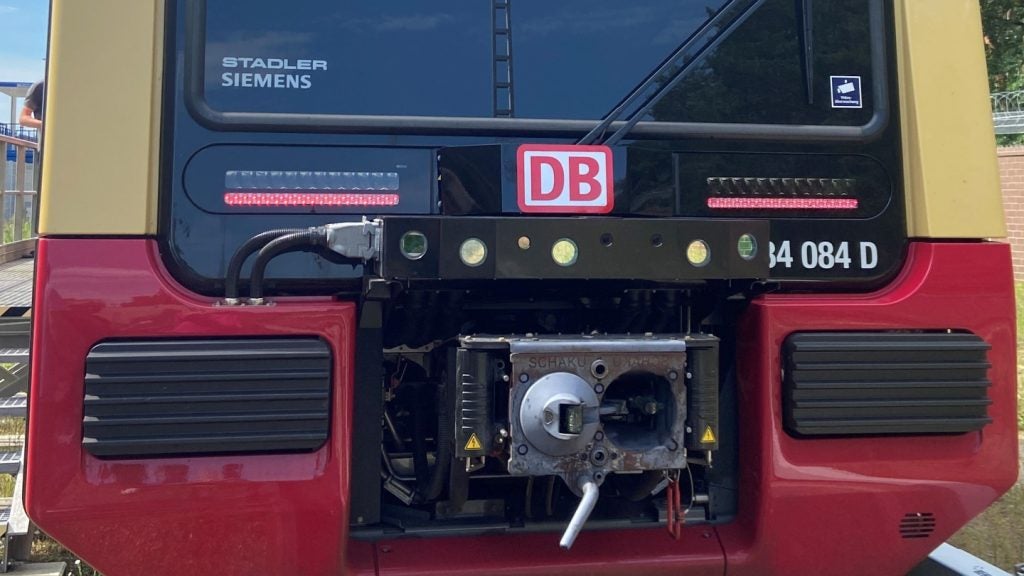The Ankara-Izmir high-speed railway (HSR) is a critical national transportation project being developed to provide connectivity between the Turkish capital Ankara and Izmir, the country’s third biggest city by population, and the main Aegean port.
The project is owned by the Directorate General of Infrastructure Investments (AYGM) of the Republic of Turkey Ministry of Transportation and Infrastructure (MoTI) and will be operated by the Turkish Railways (TCDD), upon commissioning.
It is part of the national government’s plans to expand the country’s HSR network to 10,000km by 2023.
Ankara-Izmir HSR project route details
The 503.2km-long HSR route will start from Ankara and end at Izmir. The entire route is divided into four sections. The 151.2km-long first section will run from Polatli (Ankara) to Afyonkarahisar.
The second section between Afyonkarahisar and Banaz will be 90.3km long. It will have two subsections, namely the 78.8km Afyonkarahisar-Hatipler Passage (section 2a), and the 11.5km Hatipler-Banaz subsection (also known as section 2b).
The 159.9km-long third section will be between Banaz and Salihli. It will comprise the 85.6km Banaz-Esme (section 3a), and 74.3km Esme-Salihli (section 3b) subsections.
The final section of the new railway line will be 101.8km long and will be built between Salihli and Menemen (Izmir). It will consist of four subsections. The 17.5km-long section 4a and the 44.5km-long section 4b will be run between Salihli and Manisa. The remaining subsections of the fourth section will be the 14km-long Manisa North Passage (section 4c), and the 25.8km-long Manisa-Menemen subsection (section 4d).
The HSR project will connect the Ankara-Izmir HSR to other HSRs, or conventional railways. The railway line will pass through the provinces of Ankara, Eskisehir, Afyonkarahisar, Kutahya, Usak, Manisa, and Izmir.
Construction of the Ankara-Izmir HSR project
Construction includes line superstructure works, including the construction, testing, and commissioning of under ballast and ballast layers, prefabricated superstructure panels, rails, sleepers, and turnouts.
Electrification work includes the design and commissioning of catenary systems, transformer substations, remote-control system, and tunnel electromechanical systems. Furthermore, the project will involve telecommunication and signalling works.
The line will be equipped with network communication system, telephone system, and global systems for mobile communications-railway (GSM-R). Fibre optic and communication cable infrastructure will also be installed.
Signalling works will include the design and commissioning of centralised traffic control (CTC) command centre systems, interlocking systems, and roadside equipment.
Benefits of the Ankara-Izmir HSR project
The Ankara-Izmir HSR project will improve regional rail connectivity and provide a sustainable alternative transport option. It is expected to reduce traffic congestion on roads and boost tourism in Izmir.
Being an electric railway line, it will decarbonise travel and help Turkey to meet its climate change commitments made at the 2021 United Nations Climate Change Conference (COP26) in Glasgow, Scotland.
The project is estimated to significantly reduce the travel time between Ankara and Izmir to three and half hours, down from 14 hours, by existing indirect railway lines, and approximately nine hours via the 587km-long Ankara-Izmir motorway.
Financing for the Ankara-Izmir HSR project
The UK Government reached an agreement with Turkey to help finance the construction of the HSR project in March 2022. The funding worth €2.1bn ($2.3bn) was led by Credit Suisse and Standard Chartered while UK’s export credit agency, the UK Export Finance (UKEF), will provide guarantee under a green loan structure.
International export credit agencies such as Italy’s SACE, Switzerland’s SERV, and Austria’s OeKB agreed to provide reinsurance for the funding deal.
Contractors involved in Ankara-Izmir HSR project
GEM Sustainability Services and Consultancy prepared the environmental and social impact assessment (ESIA) report and non-technical summary (NTS) for the Ankara-Izmir HSR project. It also prepared the resettlement policy framework for the land acquisition for the project.
Ankara-Izmir HSR Construction joint venture (JV), or ERG Group Partnership, or Ankara-Izmir YHT Yapimi Is Ortakligi, or ERG JV was awarded the construction tender for the project including infrastructure, superstructure, electrification and signalling, structural works.
The JV comprises three sister companies, namely ERG International UK, ERG Construction, and SSB Sauerwein & Schaefer Bau (SSB).
Makimsan, a company based in Turkey, received a contract to construct the infrastructure for the Ankara (Polatli)-Afyonkarahisar section. The contractual scope includes ten tunnels, 17 viaducts, 74 underpasses, 31 overpasses, 24 bridges, and 187 culverts.
Doğuş Construction and Trade, a construction company based in Turkey, is responsible for the infrastructure work of the Afyonkarahisar-Uşak (Banaz) section. The scope of the work includes nine tunnels, seven bridges, 11 viaducts, 15 overpasses, and 46 underpasses.
ALTINOK Consulting Engineering, an independent consultant, was engaged to provide construction supervision, consultancy, and engineering services for the Banaz-Esme section. The contract covers three stations and siding stations, 136 culverts, five bridges, 41 underpasses, 34 overpasses, and seven viaducts.
AGA Energy was contracted for infrastructure works related to sections 3a and 4d while Bayburt Grup-Kolin JV and NAS-Budakyol JV are responsible for the infrastructure works of sections 3b and 4a, respectively.
YDA-Sigma-Makimsan-Burkay Partnership was contracted for infrastructure construction works for the Ankara (Polatli)-Afyonkarahisar section.










